Grazing tables have become the centerpiece of modern entertaining, offering guests a visual feast that’s as beautiful as it is delicious. Whether you’re planning a wedding reception, birthday celebration, or casual gathering, a well-designed grazing table creates an interactive dining experience that encourages mingling and conversation. In this comprehensive guide, we’ll walk you through everything you need to know to create a professional-looking grazing table that will impress your guests without breaking the bank.
The beauty of grazing tables lies in their versatility and visual impact. With the right planning and presentation techniques, you can transform simple ingredients into an abundant display that serves as both a meal and a stunning focal point for your event. Let’s dive into the essentials of creating the perfect grazing table for any occasion.
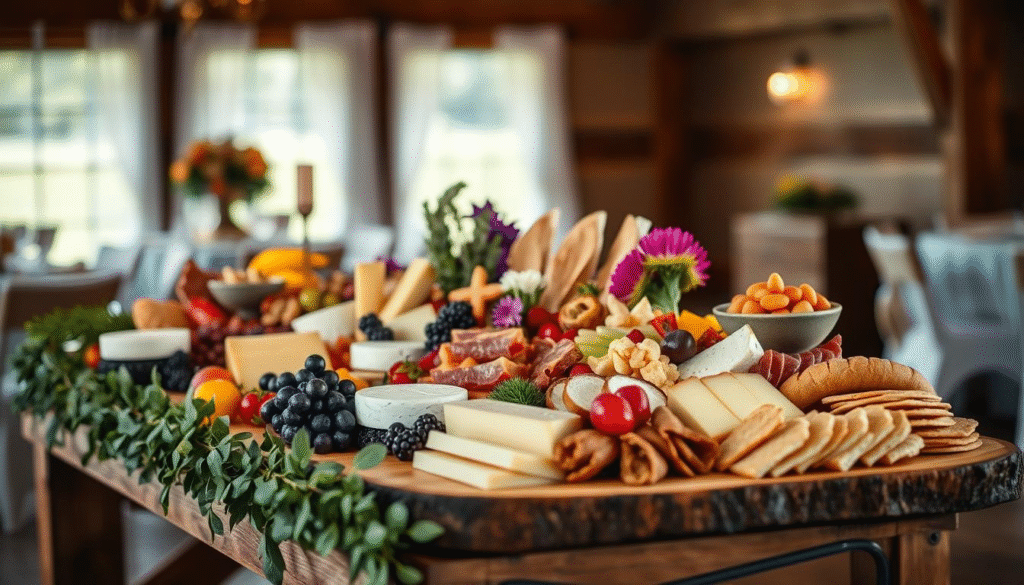
Free Grazing Table Planning Kit
Get our complete planning guide with printable shopping lists, portion calculators, and layout templates to make your grazing table a guaranteed success!
What Is a Grazing Table?
A grazing table is an abundant spread of food artfully arranged on a table surface, allowing guests to freely “graze” throughout an event. Unlike traditional buffets with separate serving dishes, grazing tables present food directly on the table surface, creating a visually stunning, abundant display that serves as both catering and decoration.
Grazing tables typically feature a variety of complementary foods including cheeses, cured meats, fresh and dried fruits, nuts, dips, breads, and crackers. The key characteristic is the seamless, overflowing presentation style that creates an impression of abundance and encourages casual, continuous eating rather than formal dining.
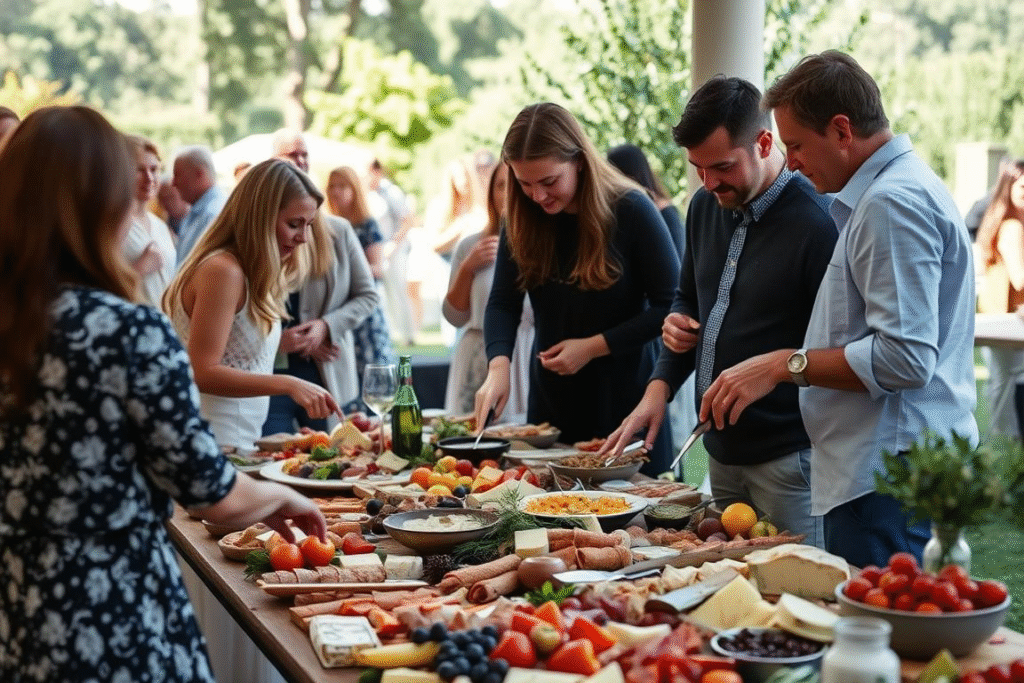
Purpose of Grazing Tables
- Create a relaxed, interactive dining experience
- Encourage mingling and conversation among guests
- Serve as both functional catering and visual decoration
- Accommodate various dietary preferences in one display
- Provide continuous food service without formal timing
When to Use Grazing Tables
- Wedding receptions and cocktail hours
- Birthday celebrations and milestone events
- Corporate functions and networking events
- Holiday gatherings and seasonal celebrations
- Casual home entertaining and dinner parties
Step-by-Step Grazing Table Setup
Creating a stunning grazing table begins with proper planning and setup. Follow these steps to ensure your table is both functional and visually impressive.

1. Select Your Surface
Choose a clean, sanitized surface that provides adequate space for your guest count. For 20-30 guests, aim for a table at least 6 feet long. For larger groups of 40+, consider extending to 8-10 feet or creating multiple grazing stations.
For easy cleanup, line your table with food-safe butcher paper or parchment paper. This not only protects your surface but also creates a clean, neutral backdrop for your food display.
2. Create Height Variations
Dimensional displays are more visually interesting and make it easier for guests to access food from all sides of the table. Use these elements to add height:
- Wooden boards and slate tiles at different levels
- Cake stands and pedestal servers
- Overturned bowls with platters on top
- Stacked books covered with parchment paper
- Wine crates or wooden boxes
3. Position Key Serving Vessels
Before adding food, place your serving vessels strategically across the table:
Essential Tableware
- Small bowls for dips, olives, and wet ingredients
- Wooden boards for cheeses and meats
- Shallow platters for crackers and bread
- Ramekins for honey, jams, and mustards
- Cheese knives and serving utensils
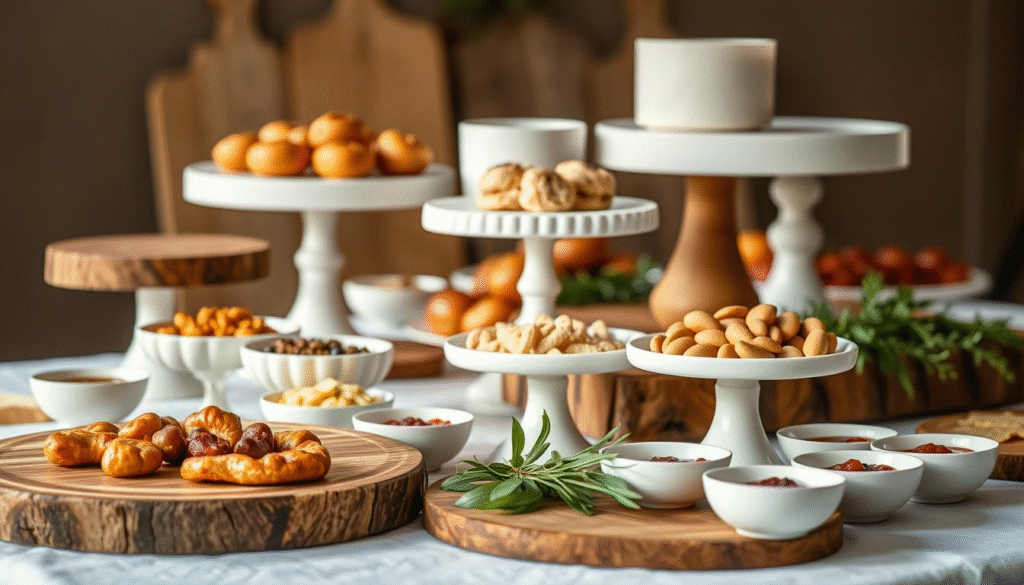
Placement Strategy
- Position bowls of dips and spreads throughout the table
- Place serving utensils beside each food that requires them
- Create “stations” for different food categories
- Ensure all areas of the table are accessible from multiple sides
- Leave some space between vessels for loose items
PRO TIP #1: The Rule of Thirds
“When setting up your grazing table, follow the rule of thirds: one-third cheese and meats, one-third fruits and vegetables, and one-third breads and crackers. This ensures a balanced presentation and accommodates different dietary preferences.” – Emma Carter, Professional Event Stylist
Need Help With Quantities?
Our interactive portion calculator helps you determine exactly how much food to buy based on your guest count and event duration.
Food Selection Guide for the Perfect Grazing Table
The key to a successful grazing table is offering variety while ensuring flavors complement each other. Here’s a comprehensive guide to selecting the right foods for your display.
Cheese Selection (5 Essential Types)
A diverse cheese selection forms the foundation of any grazing table. Include these five types for a well-rounded offering:
| Cheese Type | Recommended Varieties | Serving Style | Pairing Suggestions |
| Soft Cheese | Brie, Camembert, Goat Cheese | Whole wheels with one slice cut | Honey, fig jam, fresh berries |
| Semi-Soft Cheese | Havarti, Fontina, Gouda | Sliced or cubed | Grapes, apples, stone fruits |
| Hard Cheese | Aged Cheddar, Manchego, Parmesan | Chunks with cheese knife | Quince paste, nuts, dried fruits |
| Blue Cheese | Gorgonzola, Stilton, Roquefort | Wedge with cheese knife | Honey, walnuts, pears |
| Specialty Cheese | Wine-soaked, Truffle-infused, Smoked | Small portions as accent | Artisan crackers, specialty preserves |

Meat Pairings (3 Essential Categories)
Cured meats add savory depth to your grazing table. Include these three categories for a balanced selection:
Thinly Sliced Cured Meats
- Prosciutto
- Serrano ham
- Speck
- Coppa
Presentation: Fold or loosely arrange in waves for height and texture
Sliced Salami Varieties
- Genoa salami
- Soppressata
- Chorizo
- Pepperoni
Presentation: Fan out in overlapping circles or create salami roses
Specialty Meats
- Pâté
- Terrine
- Rillettes
- Smoked salmon
Presentation: Serve in small portions with appropriate spreaders
Seasonal Fruits and Vegetables
Fresh produce adds color, texture, and refreshing elements to balance the rich cheeses and meats. Select seasonal options for the best flavor and value:
Spring/Summer Options
- Berries (strawberries, blueberries, raspberries)
- Stone fruits (peaches, nectarines, plums)
- Grapes (red and green varieties)
- Cherry tomatoes and cucumber slices
- Radishes and snap peas
Fall/Winter Options
- Pomegranate seeds and persimmons
- Sliced apples and pears (tossed in lemon juice)
- Dried apricots, figs, and dates
- Roasted vegetables (bell peppers, zucchini)
- Marinated olives and pickled vegetables
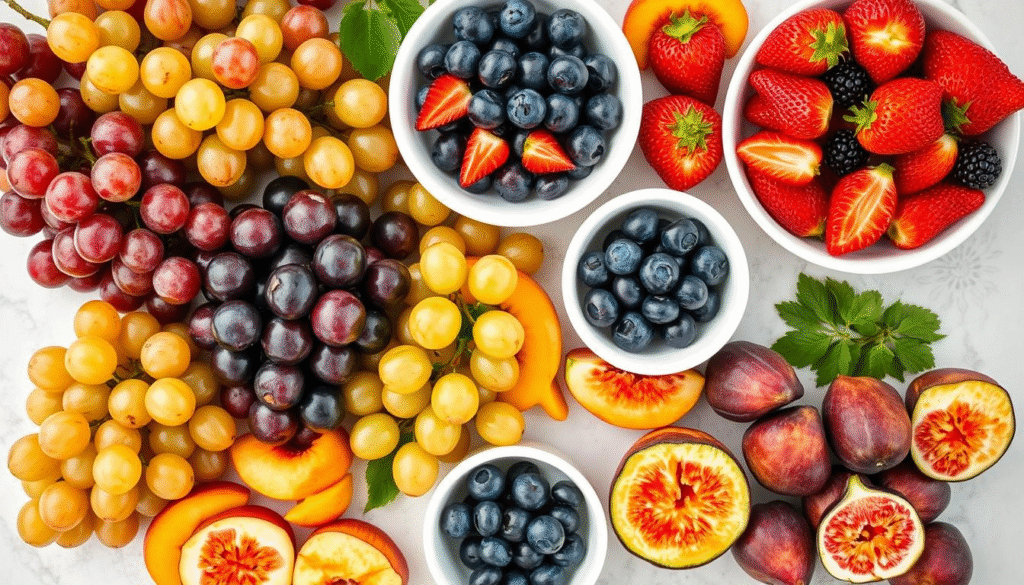
Breads, Crackers, and Accompaniments
These items provide the foundation for enjoying cheeses and spreads while adding texture and visual interest:
- Breads: Sliced baguette, focaccia, rustic sourdough, breadsticks
- Crackers: Water crackers, seeded crackers, flatbreads, gluten-free options
- Nuts: Marcona almonds, walnuts, pistachios, candied pecans
- Spreads: Fig jam, honey, whole grain mustard, onion relish
- Dips: Hummus, olive tapenade, whipped ricotta, artichoke dip
Decorative Elements
Enhance the visual appeal of your grazing table with these edible and non-edible decorative elements:
Edible Decorations
- Fresh herbs (rosemary, thyme, sage sprigs)
- Edible flowers (pansies, nasturtiums, lavender)
- Honeycomb pieces
- Chocolate-dipped fruits
- Colorful vegetable crudités
Non-Edible Accents
- Eucalyptus or olive branch garlands
- Small vases with fresh flowers
- Themed props (seasonal ornaments, etc.)
- Descriptive food labels or small signs
- Ambient lighting (small candles, fairy lights)
PRO TIP #2: Color Psychology
“Use color strategically on your grazing table. Arrange foods to create a rainbow effect, or focus on a specific color palette that matches your event theme. The human eye is naturally drawn to colorful displays, making your table more appealing.” – James Bennett, Food Styling Expert
Presentation Tips: 3 Visual Arrangement Styles
The visual presentation of your grazing table is what transforms it from a simple spread of food into an impressive focal point. Here are three distinct styling approaches to inspire your creation.
1. Rustic Farmhouse Style
This approach embraces natural materials, abundant displays, and a casual, lived-in aesthetic that’s perfect for relaxed gatherings.
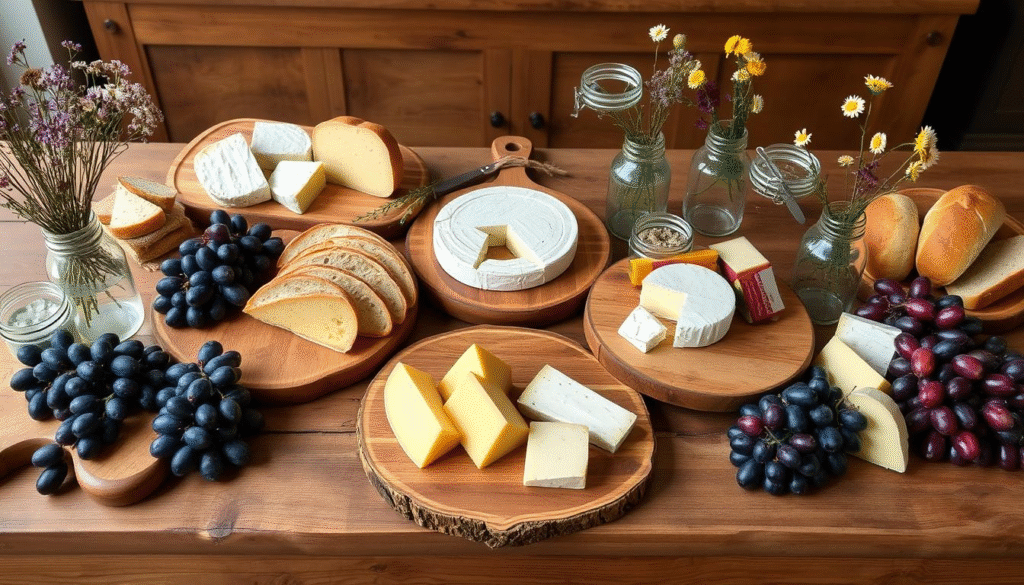
- Key Elements: Wooden boards, terracotta dishes, burlap runners
- Arrangement Style: Abundant and slightly messy, with intentional spilling of items
- Color Palette: Earth tones, deep reds, forest greens
- Decorative Touches: Wildflowers, herb sprigs, vintage utensils
- Perfect For: Barn weddings, country gatherings, casual home entertaining
2. Modern Minimalist Style
Clean lines, geometric arrangements, and a curated selection of premium items define this contemporary approach.
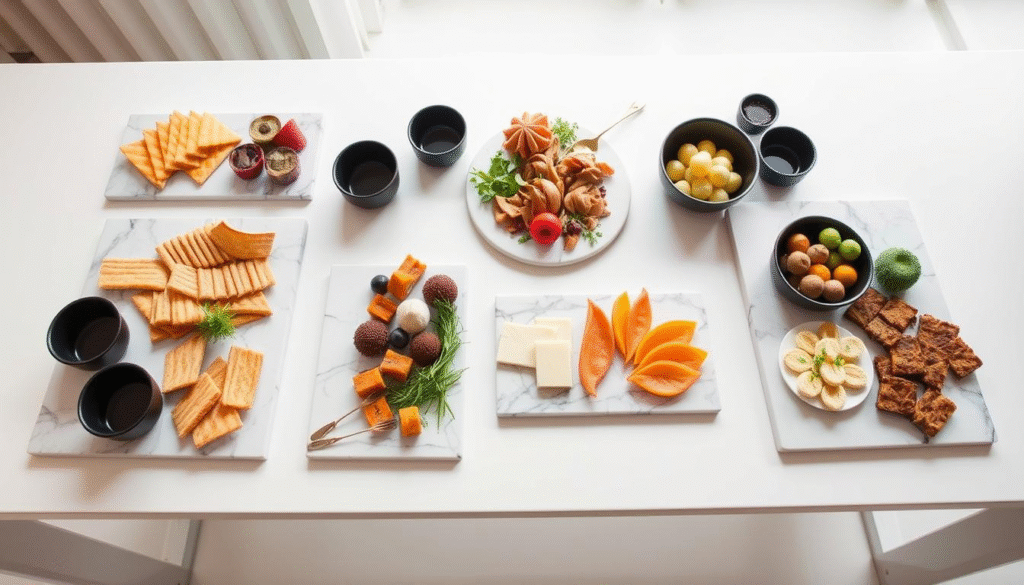
- Key Elements: Marble boards, slate tiles, glass and ceramic vessels
- Arrangement Style: Geometric patterns, straight lines, intentional spacing
- Color Palette: Monochromatic or limited color scheme
- Decorative Touches: Architectural plants, metallic accents, precise food labels
- Perfect For: Urban venues, corporate events, contemporary celebrations
3. Bohemian Eclectic Style
Vibrant colors, mixed patterns, and global influences create a free-spirited, artistic display.
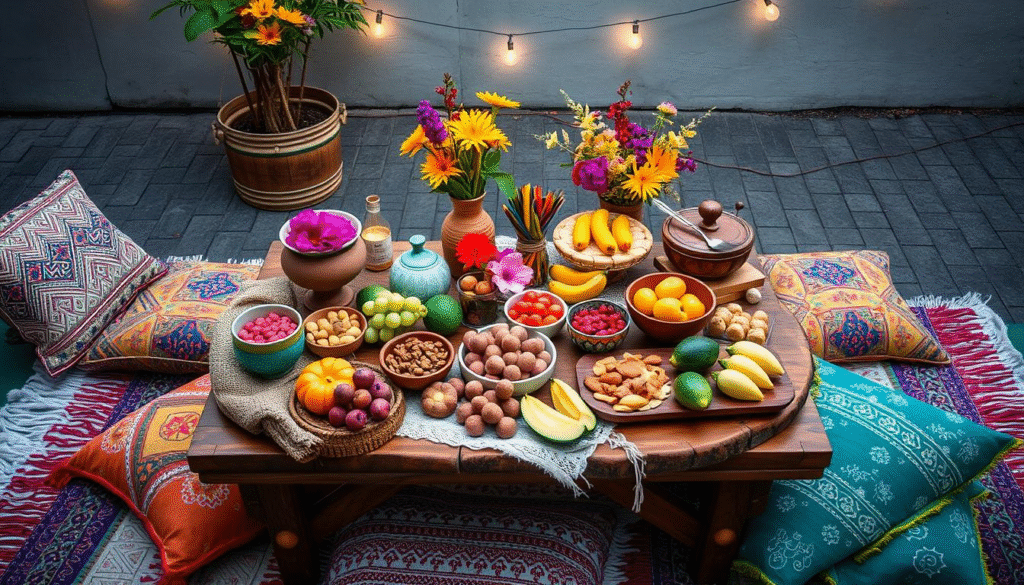
- Key Elements: Mixed patterns, colorful textiles, global-inspired serving pieces
- Arrangement Style: Free-flowing, asymmetrical, layered
- Color Palette: Rich jewel tones, vibrant contrasts
- Decorative Touches: Exotic flowers, patterned napkins, hanging elements
- Perfect For: Festival events, garden parties, artistic gatherings
Remember that the most successful grazing tables tell a visual story. Choose a style that complements your event theme and venue for a cohesive experience.
Grazing Table Visual Inspiration
Browse our gallery of 50+ stunning grazing table designs to spark your creativity and find the perfect style for your event.
Serving Etiquette and Temperature Control
Proper food safety and serving etiquette ensure your grazing table remains both beautiful and safe throughout your event.
Food Safety Guidelines
Follow these temperature control recommendations to keep your grazing table food safe for consumption:
| Food Category | Safe Serving Time | Temperature Considerations | Safety Tips |
| Cheese | Up to 4 hours | Serve at room temperature (remove from refrigerator 1 hour before) | Replace after 4 hours or if room is very warm |
| Cured Meats | Up to 2 hours | Keep cool, replace frequently | Use smaller portions and refresh throughout event |
| Fresh Fruits/Vegetables | Up to 4 hours | Keep fruits that brown (apples, pears) in acidulated water | Place cut fruits on ice trays during summer events |
| Dips and Spreads | Up to 2 hours | Use small portions in shallow dishes | Place bowls in larger ice-filled containers |
Temperature Control Methods
- Use marble or chilled stone surfaces under cheese plates
- Place ice packs wrapped in decorative cloths beneath serving boards
- Utilize tiered servers with ice compartments for temperature-sensitive items
- Prepare backup trays in refrigerator for quick replacement
- Consider refrigerated serving platters for outdoor summer events
Serving Etiquette
Enhance the grazing experience for your guests with these thoughtful serving considerations:
Essential Serving Tools
- Cheese knives (different styles for different cheeses)
- Small tongs for picking up meats and fruits
- Cocktail forks or decorative toothpicks
- Small spoons for dips and spreads
- Serving spatulas for soft cheeses
Guest Convenience Items
- Small plates (6-inch diameter works well)
- Cocktail napkins placed throughout the table
- Clear signage for specialty items or allergens
- Hand sanitizing stations nearby
- Waste receptacles within easy reach

PRO TIP #3: The Replenishment Strategy
“Never let your grazing table look depleted. Prepare 30% more food than you think you’ll need, stored in the refrigerator on pre-arranged boards. Every hour, subtly refresh the table with these backup platters to maintain that abundant, untouched look throughout your event.” – Sophia Martinez, Celebrity Event Planner
Food Safety Cheat Sheet
Download our printable temperature guide and food safety checklist to ensure your grazing table remains safe throughout your event.
7 Creative Grazing Table Theme Ideas
Themed grazing tables create memorable experiences that align with your event’s purpose. Here are seven creative concepts to inspire your next gathering.
1. Elegant Wedding Grazing Table

- Premium cheeses (triple cream brie, aged gouda)
- Champagne grapes and white strawberries
- Edible gold leaf accents
- White and cream color palette with metallic touches
- Crystal and silver serving pieces
2. Kids’ Party Snack Board

- Cookie-cutter cheese shapes
- Fruit skewers and vegetable “rainbow”
- Mini sandwiches and pizza bites
- Chocolate-dipped pretzels and strawberries
- Colorful dips with vegetable “dippers”
3. Mediterranean Feast

- Variety of olives and marinated vegetables
- Hummus, tzatziki, and baba ganoush
- Feta, halloumi, and labneh
- Stuffed grape leaves and falafel
- Pita bread and lavash crackers
4. Seasonal Harvest Table

- Seasonal fruits and vegetables
- Spiced nuts and mulled cider
- Seasonal preserves and honey
- Herb-infused cheeses
- Decorative seasonal elements (mini pumpkins, etc.)
5. Breakfast/Brunch Grazing

- Pastries, croissants, and bagels
- Yogurt parfait station with toppings
- Fresh fruit and berries
- Smoked salmon and cream cheese
- Granola, honey, and preserves
6. Dessert Grazing Table

- Chocolate-dipped fruits and nuts
- Mini pastries and petit fours
- Cookies and brownie bites
- Sweet dips (chocolate, caramel, fruit)
- Fresh berries and edible flowers
7. Global Cheese Tour
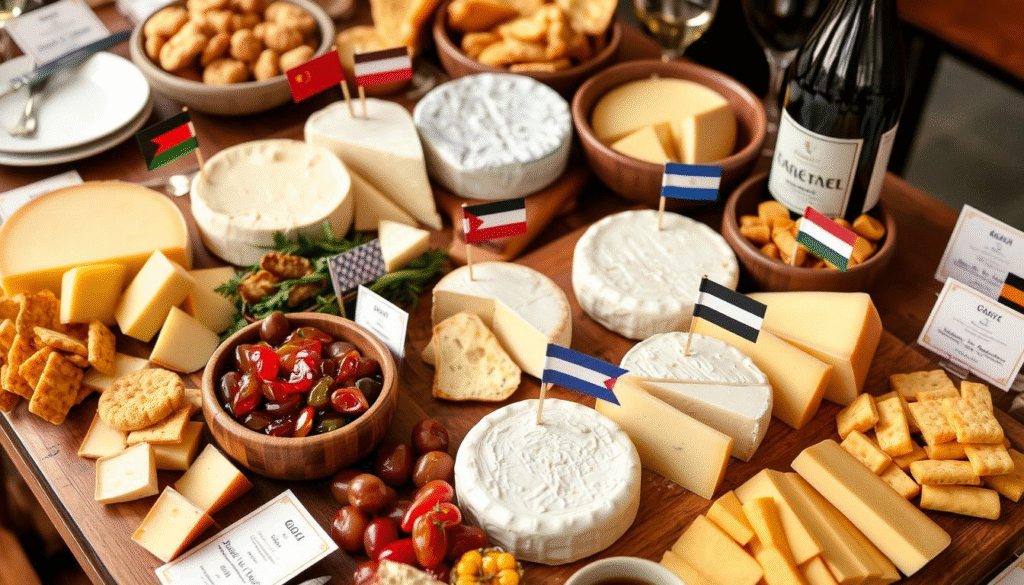
- Cheeses from different countries with origin labels
- Region-specific accompaniments (Spanish membrillo with Manchego)
- International bread and cracker selection
- Small flags or markers identifying cheese origins
- Information cards about cheese-making traditions
Creating Your Signature Grazing Table
The beauty of grazing tables lies in their versatility and personal expression. By combining the technical guidance in this article with your own creative vision, you can create a truly memorable dining experience for your guests.
Remember that the most successful grazing tables balance visual impact with practical functionality. Start with quality ingredients, thoughtful arrangement, and attention to food safety. Then add your personal touch through theme, color palette, and decorative elements that reflect your event’s purpose and your personal style.
Whether you’re creating an elaborate wedding display or a casual gathering at home, the principles remain the same: abundance, accessibility, and visual appeal. With practice, you’ll develop your own signature style that will impress guests and create a dining experience they’ll remember long after the event.
The true art of a grazing table is in creating a display so beautiful that guests hesitate to take from it—but so inviting that they can’t resist diving in.
Ready to Create Your Perfect Grazing Table?
Get our complete planning kit with printable shopping lists, portion calculators, and layout templates to make your grazing table a guaranteed success!

